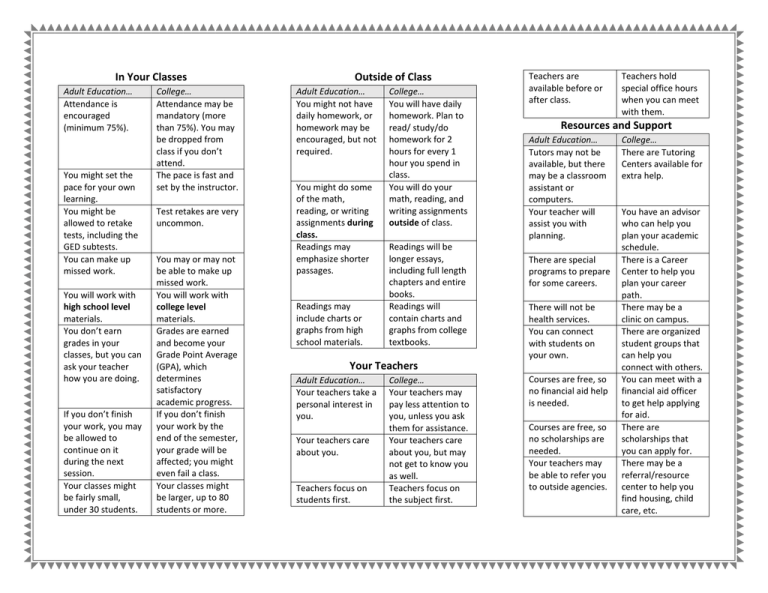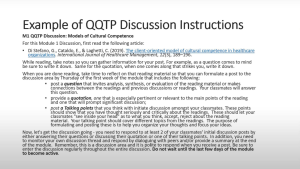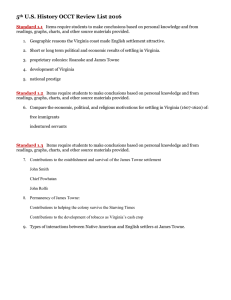Microsoft Word Format - MNADE Minnesota Association for
advertisement

In Your Classes Adult Education… Attendance is encouraged (minimum 75%). You might set the pace for your own learning. You might be allowed to retake tests, including the GED subtests. You can make up missed work. You will work with high school level materials. You don’t earn grades in your classes, but you can ask your teacher how you are doing. If you don’t finish your work, you may be allowed to continue on it during the next session. Your classes might be fairly small, under 30 students. College… Attendance may be mandatory (more than 75%). You may be dropped from class if you don’t attend. The pace is fast and set by the instructor. Test retakes are very uncommon. You may or may not be able to make up missed work. You will work with college level materials. Grades are earned and become your Grade Point Average (GPA), which determines satisfactory academic progress. If you don’t finish your work by the end of the semester, your grade will be affected; you might even fail a class. Your classes might be larger, up to 80 students or more. Outside of Class Adult Education… You might not have daily homework, or homework may be encouraged, but not required. You might do some of the math, reading, or writing assignments during class. Readings may emphasize shorter passages. Readings may include charts or graphs from high school materials. College… You will have daily homework. Plan to read/ study/do homework for 2 hours for every 1 hour you spend in class. You will do your math, reading, and writing assignments outside of class. Readings will be longer essays, including full length chapters and entire books. Readings will contain charts and graphs from college textbooks. Your Teachers Adult Education… Your teachers take a personal interest in you. Your teachers care about you. Teachers focus on students first. College… Your teachers may pay less attention to you, unless you ask them for assistance. Your teachers care about you, but may not get to know you as well. Teachers focus on the subject first. Teachers are available before or after class. Teachers hold special office hours when you can meet with them. Resources and Support Adult Education… Tutors may not be available, but there may be a classroom assistant or computers. Your teacher will assist you with planning. There are special programs to prepare for some careers. There will not be health services. You can connect with students on your own. Courses are free, so no financial aid help is needed. Courses are free, so no scholarships are needed. Your teachers may be able to refer you to outside agencies. College… There are Tutoring Centers available for extra help. You have an advisor who can help you plan your academic schedule. There is a Career Center to help you plan your career path. There may be a clinic on campus. There are organized student groups that can help you connect with others. You can meet with a financial aid officer to get help applying for aid. There are scholarships that you can apply for. There may be a referral/resource center to help you find housing, child care, etc. From Adult Education Tips and Preparation For Adult Education… Practice on the computer as much as you can. Even though class may be flexible, organize child care to maximize your success. Communicate with your teacher immediately if you have a problem. Introduce yourself to some classmates and plan to study together. Get a library card and check out books to read that you enjoy. Watch the news to learn more about current events. to College: Your Guide For College… Learn to type on a computer keyboard. Plan for child care so you can attend classes. Don’t rely on favors; use reliable services. Communicate with your teacher immediately if you have a problem. Introduce yourself to some classmates and plan to study together. Read books from the library on many topics to build background knowledge. Watch the news to learn more about current events. to a Successful This document is licensed under a Creative Commons Attribution 3.0 License. See http://creativecommons.org/ for more information. Created with support from the Minnesota Association for Developmental Education by Holly Fairchild and Linda Russell. You may access this document at www.mnade.org. Transition You CAN learn to navigate the College System!








